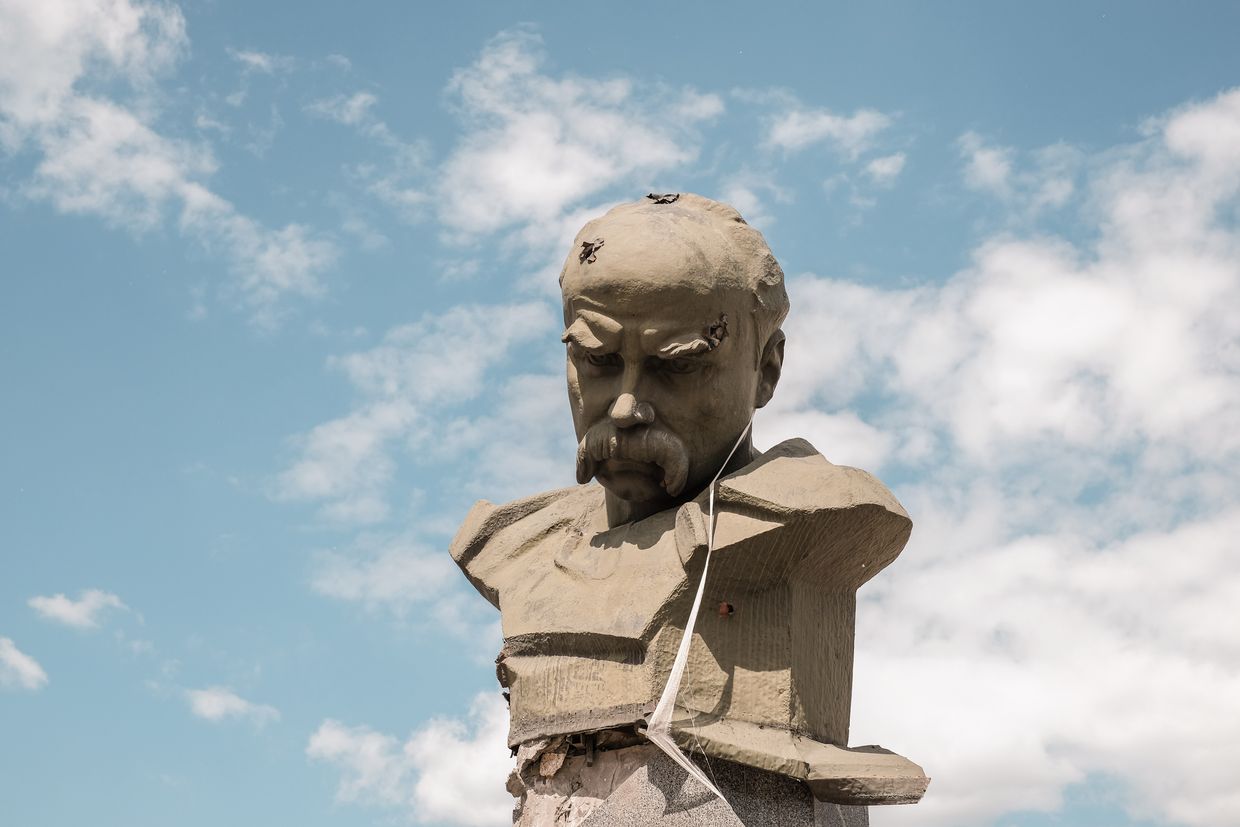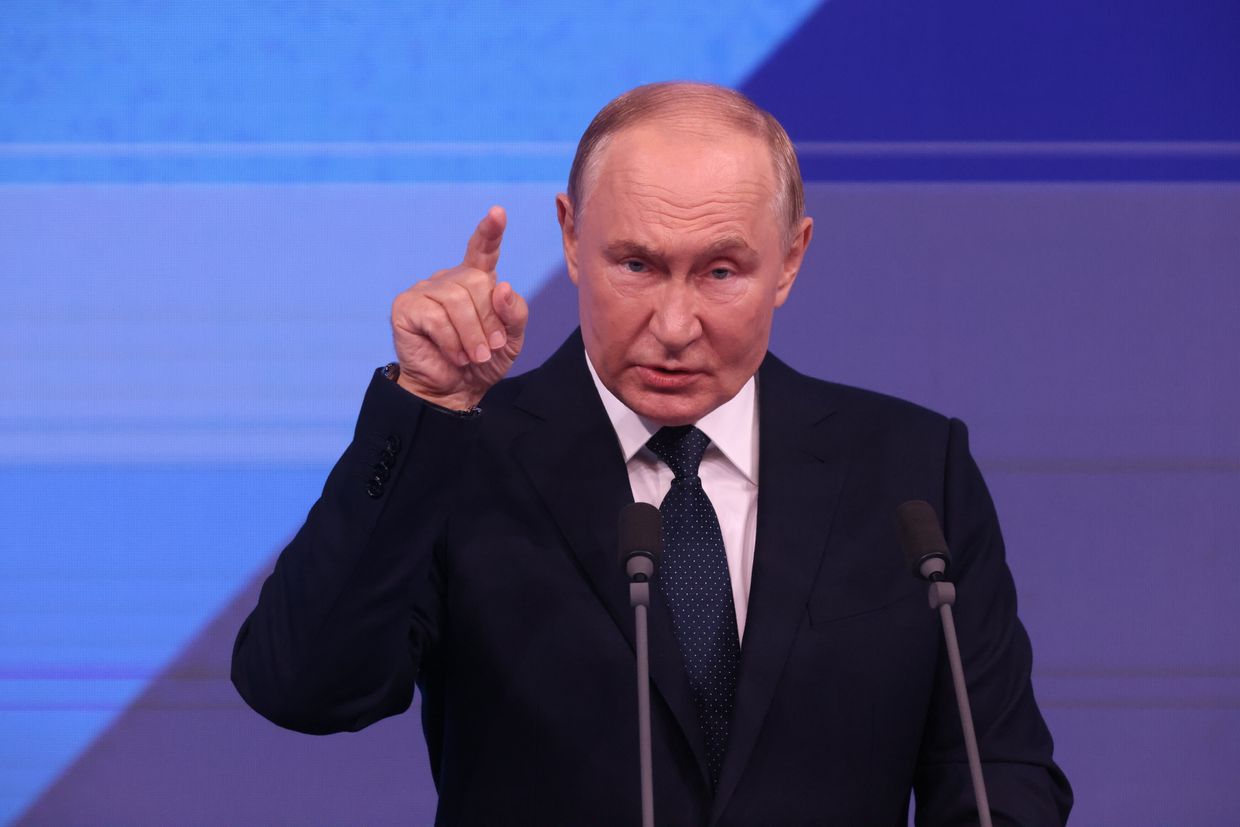Opinion: Silent victims of sexual violence, Ukraine’s male POWs deserve real support
Ukraine’s male POWs face an often overlooked, brutal reality of sexual violence in Russian custody — yet the system meant to help them heal falls tragically short.

A Ukrainian soldier hugs their partner near a Ukrainian military base near Lviv, Ukraine, on March 2, 2022. (Daniel Leal / AFP via Getty Images)

Kseniya Kvitka
Assistant researcher at Human Rights Watch
This article contains descriptions of physical and sexual violence, which may be disturbing to some readers. Reader discretion is advised.
Forced nudity during “welcome beatings,” naked “crouch walking,” and gratuitous stripping and body cavity searches are but a few examples of the abuse Viktor Lakhno, 26, a former prisoner of war (POW), endured in Russian custody.
Ukrainian men detained by Russian and Russian-affiliated forces, including prisoners of war, regularly report that their captors, including penitentiary staff, engaged in sexual violence. Reports include rape, threats of rape, forced penetration with foreign objects, electric shocks to genitalia, and other forms of torture like those Lakhno experienced. The abuse is said to punish, intimidate, demoralize, or extract confessions.
Sexual violence has been committed against both women and men. While sexual violence disproportionately affects women detainees, male prisoners are likely to experience it more often than documented.
A military psychologist who worked at Sanzhary Hospital, a Ukrainian state-run facility for former POWs, told me that about 80% of the former detainees she assisted had experienced sexual violence in Russian captivity.
Tetiana Sirenko, deputy director of the Lisova Poliana mental health and rehabilitation center, estimated that at least half of the former detainees, both military and civilian, reported sexual violence while in Russian custody.
Since the start of Russia’s full-scale invasion, the UN Human Rights Monitoring Mission in Ukraine has documented numerous instances of sexual violence against male detainees in Russian custody. Ukraine’s Prosecutor General’s Office has recorded 114 cases against men and boys, and 202 against women and girls, both civilians and POWs.
Given that 57 prisoner exchanges have returned 3,672 Ukrainian military personnel and civilians as of mid-September, and that sexual violence is often unreported due to stigma, fear of reprisals, or lack of safe reporting mechanisms, the actual number of victims is likely much higher.
Russian forces captured Lakhno at the Azovstal steel factory on May 17, 2022, following the months-long siege of Mariupol. He spent 13 months in Olenivka and Horlivka prisons in Russian-occupied eastern Ukraine. In June 2023, he was released in a prisoner exchange and shared his ordeal with me in Kyiv. When I asked if he sought assistance, he said: “We don’t talk about it; we laugh. Everything is seen in comparison. In those conditions, we adapted.”
Research into the subject in other contexts has shown that survivors may experience psychological distress, such as depression, post-traumatic stress disorder, sexual trauma, and paranoia. If left untreated, these can cause long-term mental and physical health issues.
Yet, the options for help are limited. Upon returning to Ukraine, POWs are entitled to four to eight weeks of government-funded medical and psychological treatment. While services are available, Ukrainian groups say they are far from sufficient.
“Opening up about sexual violence requires time, to allow a sense of safety and therapeutic trust,” Sirenko told me. Released POWs rarely get the time they need, as they are usually required to return quickly to their military units. Unreported or undertreated cases “might cause further acute symptoms.”

A new mobilization law adopted in May could make a difference by allowing former POWs to voluntarily leave active duty or take an extended 90-day break. Time will tell how effective these changes will be.
However, the military psychologist noted that many survivors feel compelled to return to the battlefield to avenge their trauma. But without proper recovery, they risk severe mental and physical repercussions.
Although some experts report low trust in the army's psychological services, seeking treatment outside state-run facilities can also be challenging. According to experts, very few psychologists in Ukraine specialize in working with male survivors, particularly POWs. Nor do they have the time needed to build trust with those recently released.
The standard rehabilitation process for POWs can itself exacerbate trauma. Released POWs are interviewed by up to five different law enforcement agencies. Experts say POWs may face improper, insensitive questioning from investigators who are pressed for time and resources and are not trained to work with traumatized survivors.
Law enforcement officials and others who interview sexual violence survivors “either don’t inquire about such experiences or do so without proper sensitivity in their tone or clarity in wording,” Sirenko said. “Many survivors fear these interviews, thinking that nobody will be on their side.”
Prosecutors working with former POWs said that after the standardized questionnaire, investigators are supposed to ask whether soldiers experienced sexual violence in detention. If they say they did, investigators are not supposed to ask them further about their experiences but refer their case to a special unit in the Prosecutor General’s Office.
In an attempt to sensitize investigators and mitigate re-traumatization risks, hospital staff say they regularly encourage investigators to listen to recordings of debriefings – conversations that psychologists hold with those released during their first week back – to help guide their questioning. However, the former hospital psychologist said investigators “rarely listen to them.”
A military psychologist told me that only a small number of investigators, particularly police officers, conduct interviews with the accuracy and empathy required for such situations.
“If there is no understanding among the institution’s leadership of the importance of the psychological aspects of working with survivors, and if investigators don’t have the personal qualities to find the right approach, yet another training session won’t make any difference,” she said.
After repeated interviews, testimonies may become rehearsed, which can raise suspicions of espionage. In some cases, investigators may even subject former POWs to polygraph tests to verify their accounts, increasing a survivor’s emotional trauma.
Ukrainian authorities should ensure that investigators, health practitioners, and others are adequately trained to identify such cases and are equipped to provide timely, accessible, and effective services for men linked to the sexual nature of the abuse, allowing them to recover at their own pace. All survivors of sexual violence need proper services to overcome trauma, as well as access to justice and reparations.
Editor’s Note: The opinions expressed in the op-ed section are those of the authors and do not reflect the views of the Kyiv Independent.












